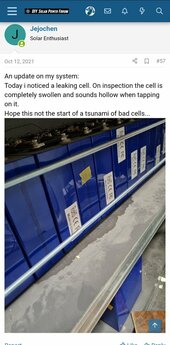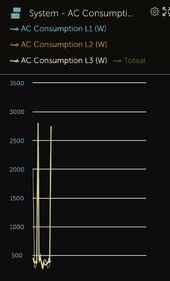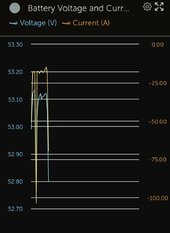You are using an out of date browser. It may not display this or other websites correctly.
You should upgrade or use an alternative browser.
You should upgrade or use an alternative browser.
House burned down
- Thread starter Jejochen
- Start date
kolek
Inventor of the Electron
- Joined
- Sep 29, 2021
- Messages
- 564
Sympathies to OP. Hope your insurance takes good care of you and thanks for posting this so the community can learn.
I have this to add:
1. Fire inspector conclusions questionable
I am skeptical about the fire inspector blaming the fuse. Maybe that's culprit, maybe not. I'd like to see the report from the inspector to see what basis he had for making that conclusion, but judging from the picture, I doubt there was much evidence left to support any conclusion.
2. Past battery problems a potential clue
In the past, the OP had a cell in his battery that swelled and leaked. IMHO this is an extreme event that may be potentially related to the fire, albeit a fire happened much later. Decent quality cells don't just swell and vent under normal use. Either the cells were poor quality to begin with, or they were mishandled/overcharged/excessively discharged/charged below freezing, etc., but I would not be surprised if there is some relationship between whatever caused that cell to leak and the eventual fire itself. The OP says he replaced that cell that vented, as though that chapter was closed. But whatever caused that single cell to vent probably also damaged the other cells, perhaps not to the point of venting, but to the point that they were thereafter compromised and unsafe.
Posting again the image from the OP of the cell vent below. If the OP has time at some point, it would be great to know more about what caused that cell to vent, if known. It's strange to me that OP just reports a cell vent and worries about a potential "tsunami of bad cells" with no explanation as to why or what caused it. Also curious what grade these cells were originally, and who was the manufacturer?
3. Safer and smarter to buy pre-made batteries
Lastly, I'm going to agree with an earlier poster that this is another good argument for buying finished batteries. For multiple reasons. As the earlier poster noted, nearly every fire reported thus far has been a DIY battery related fire. Is it worth the risks? Just a tiny design error and you potentially put your life and the lives of your loved ones at risk. Another reason is time. I've said in my own case, my DIY battery project has been a huge waste of time trying to get everything perfect and safe. When you take the safety element and the time investment into account, buying finished batteries is just smarter for most people. Unless you're too cheap or too poor to afford pre-built batteries, or your life is devoid of other more worthwhile pursuits, or you're doing it for the sake of learning, and/or you derive some kind of perverse enjoyment from DIY battery-build projects. If you can afford to buy your batteries from a reputable company pre-built, that's just the smarter and safer way to go.

I have this to add:
1. Fire inspector conclusions questionable
I am skeptical about the fire inspector blaming the fuse. Maybe that's culprit, maybe not. I'd like to see the report from the inspector to see what basis he had for making that conclusion, but judging from the picture, I doubt there was much evidence left to support any conclusion.
2. Past battery problems a potential clue
In the past, the OP had a cell in his battery that swelled and leaked. IMHO this is an extreme event that may be potentially related to the fire, albeit a fire happened much later. Decent quality cells don't just swell and vent under normal use. Either the cells were poor quality to begin with, or they were mishandled/overcharged/excessively discharged/charged below freezing, etc., but I would not be surprised if there is some relationship between whatever caused that cell to leak and the eventual fire itself. The OP says he replaced that cell that vented, as though that chapter was closed. But whatever caused that single cell to vent probably also damaged the other cells, perhaps not to the point of venting, but to the point that they were thereafter compromised and unsafe.
Posting again the image from the OP of the cell vent below. If the OP has time at some point, it would be great to know more about what caused that cell to vent, if known. It's strange to me that OP just reports a cell vent and worries about a potential "tsunami of bad cells" with no explanation as to why or what caused it. Also curious what grade these cells were originally, and who was the manufacturer?
3. Safer and smarter to buy pre-made batteries
Lastly, I'm going to agree with an earlier poster that this is another good argument for buying finished batteries. For multiple reasons. As the earlier poster noted, nearly every fire reported thus far has been a DIY battery related fire. Is it worth the risks? Just a tiny design error and you potentially put your life and the lives of your loved ones at risk. Another reason is time. I've said in my own case, my DIY battery project has been a huge waste of time trying to get everything perfect and safe. When you take the safety element and the time investment into account, buying finished batteries is just smarter for most people. Unless you're too cheap or too poor to afford pre-built batteries, or your life is devoid of other more worthwhile pursuits, or you're doing it for the sake of learning, and/or you derive some kind of perverse enjoyment from DIY battery-build projects. If you can afford to buy your batteries from a reputable company pre-built, that's just the smarter and safer way to go.

Last edited:
Ampster
Renewable Energy Hobbyist
The OP posted earlier that the inspector reached his conclusion because the area around the fuse showed signs that it was the hottest portion of the fire and likely the cause. What little I know about fire inspections is that it is an imperfect science when most of the facts have burned up.I'd like to see the report from the inspector to see what basis he had for making that conclusion.
EDIT: The OP updated the thread with a clarification that it was the area around the fuse where the fire started. In retrospect, the fire could have been what melted the fuse.
Last edited:
crossy
Solar Addict
Well well, found these on aliexpress cheap enough with fuse holder to order a few samples to evaluate. Ordered a 125amp and a 200amp version along with a holder for each. I'm afraid I intend to destroy them both in the process.
This post is nothing without a suitably explosive video!!! Where are The Mythbusters when you need them?
Enjoy!
OP, sorry to hear. I'm really glad you shared, though. I'm building out a system as we speak (non-victron), and was afraid I'd become complacent in the possibility of something like this happening. I hope that it wasn't as devastating to your family as it would be to mine.
A few data screenshots from the system.
The cells were bought as grade A cells from luyuan. Imo the leaking cell was an exception. Sometimes things just break. Thats why i didnt gave it any futher attention. All other 15 cells in that string were fine.
The cells are in a room with steady room temperature, were never discharged or overcharged. Charging specs per cell 2.8 - 3.55 v.
Batrium bms i thought and still think is a great bms. I have no idea why 1 central bms for 112 cells is "bad". If something is wrong with the system design, thats possible, but thats not the bms to blame, it did always a great job.
About being the fuse the source as the fire according to the fire inspector: i never said he said the fuse is the reason the system started to fail. Only it is there the fire started, and as he talked me through the entire research process, i strongly tend to agree with him.


The cells were bought as grade A cells from luyuan. Imo the leaking cell was an exception. Sometimes things just break. Thats why i didnt gave it any futher attention. All other 15 cells in that string were fine.
The cells are in a room with steady room temperature, were never discharged or overcharged. Charging specs per cell 2.8 - 3.55 v.
Batrium bms i thought and still think is a great bms. I have no idea why 1 central bms for 112 cells is "bad". If something is wrong with the system design, thats possible, but thats not the bms to blame, it did always a great job.
About being the fuse the source as the fire according to the fire inspector: i never said he said the fuse is the reason the system started to fail. Only it is there the fire started, and as he talked me through the entire research process, i strongly tend to agree with him.


Daddy Tanuki
Solar Wizard
Be careful there young man... You will rile the Smurfs up with blasphemy like that!I know Victron uses the Mega Fuse and for some reason, the word of the holy blue cult is treated as gospel. But the class-t fuse is much more appropriate for these batteries. You get what you pay for.
Daddy Tanuki
Solar Wizard
if that is the data from the event? so you have a time scale to go along with it? is the system 3 phase? or split phase?A few data screenshots from the system.
The cells were bought as grade A cells from luyuan. Imo the leaking cell was an exception. Sometimes things just break. Thats why i didnt gave it any futher attention. All other 15 cells in that string were fine.
The cells are in a room with steady room temperature, were never discharged or overcharged. Charging specs per cell 2.8 - 3.55 v.
Batrium bms i thought and still think is a great bms. I have no idea why 1 central bms for 112 cells is "bad". If something is wrong with the system design, thats possible, but thats not the bms to blame, it did always a great job.
About being the fuse the source as the fire according to the fire inspector: i never said he said the fuse is the reason the system started to fail. Only it is there the fire started, and as he talked me through the entire research process, i strongly tend to agree with him.
View attachment 212765View attachment 212766
What voltage is the system?A few data screenshots from the system.
The cells were bought as grade A cells from luyuan. Imo the leaking cell was an exception. Sometimes things just break. Thats why i didnt gave it any futher attention. All other 15 cells in that string were fine.
The cells are in a room with steady room temperature, were never discharged or overcharged. Charging specs per cell 2.8 - 3.55 v.
Batrium bms i thought and still think is a great bms. I have no idea why 1 central bms for 112 cells is "bad". If something is wrong with the system design, thats possible, but thats not the bms to blame, it did always a great job.
About being the fuse the source as the fire according to the fire inspector: i never said he said the fuse is the reason the system started to fail. Only it is there the fire started, and as he talked me through the entire research process, i strongly tend to agree with him.
View attachment 212765View attachment 212766
Just under 3kW on a single phase.
Is that the last info the bms recorded? Last info of the solar assistant?
The reason WHY a single bms is bad for several strings of cells is, you have no data for issues causing the bad cell.
You have no data for issues discharging each string.
Same reason why a single fuse is bad for three sets of batteries.
Zero protection for the other strings, if one goes bad...
Last edited:
kolek
Inventor of the Electron
- Joined
- Sep 29, 2021
- Messages
- 564
So according to the OP, a grade A cell from Luyuan that had been treated exactly according to guidelines, spontaneously expands and vents for no reason.The cells were bought as grade A cells from luyuan. Imo the leaking cell was an exception. Sometimes things just break. Thats why i didnt gave it any futher attention.
I'd be very curious to hear expert opinions on this.
Can this actually happen, and if so, what is the rough probability of it happening? I would have assumed it's practically impossible, or maybe 1 chance in 10,000. I thought these cells are extremely stable, especially the "real" grade A ones from Luyuan, and if they do expand and vent, you must have done something to provoke them.
Not blaming the OP of course, just curious because many of us on the forum have grade A cells from Luyuan and if they are spontaneously failing, that is a major concern.
Last edited:
3 phase systemif that is the data from the event? so you have a time scale to go along with it? is the system 3 phase? or split phase?
The data you see starts at midnight and ends 4 hrs later
spontaneously expands and vents for no reason
This is not known as a fact. The only fact we have is that the fire inspector said the fire started at the fuse.
Daddy Tanuki
Solar Wizard
so all three phase of the A/C current ramped up to +3kW and then dropped and then came back up again within 15~20 minutes... is your hottub stuff 3 phase? if so take a gander at it.3 phase system
The data you see starts at midnight and ends 4 hrs later
kolek
Inventor of the Electron
- Joined
- Sep 29, 2021
- Messages
- 564
Previous to the fire, the OP reported (see picture) that one of his grade A Luyuan cells expanded, vented, and leaked. He claims this happened for no reason.This is not known as a fact. The only fact we have is that the fire inspector said the fire started at the fuse.
Last edited:
Previous to the fire, the OP reported (see picture) that one of his grade A Luyuan cells expanded, vented, and leaked. He claims this happened for no reason.
That was 3 years ago or so, the cell was replaced, and the system worked fine for those 3 years. We can't draw conclusions from one leaking cell 3 years or so ago.
The hottub only heats during the day, when there is plenty sun energy.so all three phase of the A/C current ramped up to +3kW and then dropped and then came back up again within 15~20 minutes... is your hottub stuff 3 phase? if so take a gander at it.
At night only basic stuff like a freezer, etc or on
kolek
Inventor of the Electron
- Joined
- Sep 29, 2021
- Messages
- 564
Please indicate where I drew a conclusion.That was 3 years ago or so, the cell was replaced, and the system worked fine for those 3 years. We can't draw conclusions from one leaking cell 3 years or so ago.
Nobody knows 100% for sure what caused the fire. But it seems you're drawing the conclusion that whatever caused that grade A cell to expand and vent is completely unrelated to the fire. Just because the first event happened a couple years ago, that proves they are unrelated?
Please indicate where I drew a conclusion.
I probably read your post as this cell doing that now in this event, not three years ago.
robby
Photon Vampire
- Joined
- May 1, 2021
- Messages
- 4,199
I have a wireless security camera in my electrical room that sends video and audio to a tablet like box that comes with it.
The only problem is the recording are stored on a SD in the camera which will probably get destroyed.
I could wire in one of my Lorex 4K gamers that connect to a DVR in thouey
The only problem is the recording are stored on a SD in the camera which will probably get destroyed.
I could wire in one of my Lorex 4K gamers that connect to a DVR in thouey
Daddy Tanuki
Solar Wizard
OP, not bagging on you trust me, trying to help figure it out. I am not well worded and sometimes come off as rough around the eges, My apologies.The hottub only heats during the day, when there is plenty sun energy.
At night only basic stuff like a freezer, etc or on
Well if all three phases drew at 3kW at the same time, either something turned on that should not have, or you inverter shorted internally for some reason and fried. (just my thoughts, no proof or anything to refer to. )
That big spike and 15 to 20 minutes later a similar spike along with corresponding battery drain in that time frame. on the second spike with your amps at roughly 75 you notice how the battery dropped hard in voltage? I would bet that was the fuse popping and then shorting somehow... something shorted to draw down the voltage that hard on a combined bank of that size.
Similar threads
- Replies
- 90
- Views
- 10K
- Replies
- 12
- Views
- 862


